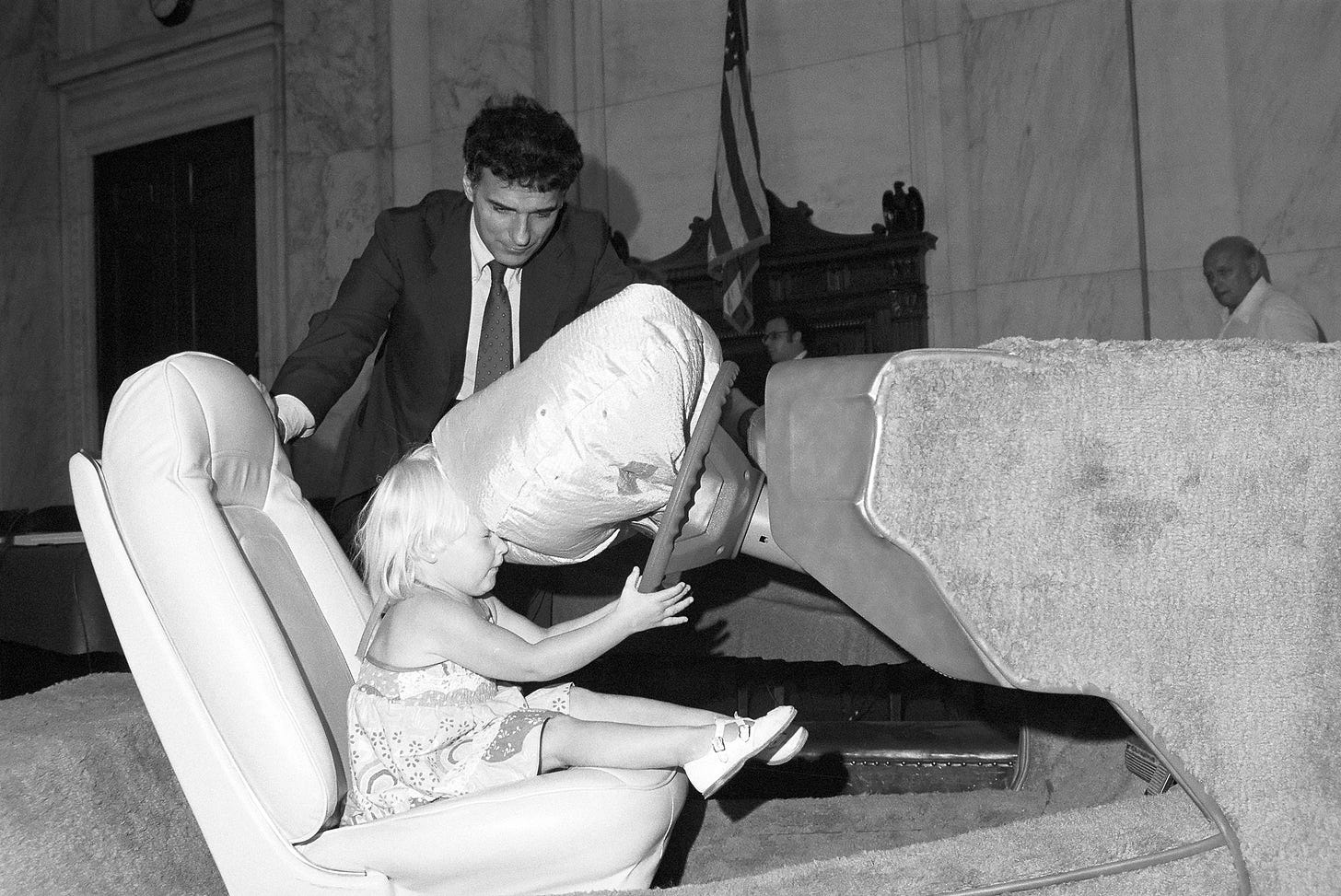Ruminating with RALPH NADER
The iconic consumer advocate is still angry about being scapegoated for Al Gore’s defeat in 2000
Ralph Nader is 87 but sharp as ever and still agitating against corporate power. I think Ralph’s history is about to be revisited. Frances Haugen's explosive testimony last week on social media safety at Facebook was reminiscent of Nader's 1965 testimony on car safety at General Motors, then the largest corporation in the country. We'll see soon whether Haugen kicks off a new era of legislation and regulation in the public interest, as Nader did.
I’ve known Ralph for more than 40 years, since I co-wrote a booklet for him on the 1980 presidential candidates (I chronicled John Anderson’s record) and learned first-hand about his monk-like qualities. In those days, I was already not as liberal as Nader but I agreed—and still do—with the consensus among historians that he was one of the most important figures of the 20th century. Beyond saving tens of thousands of lives with his auto safety campaign, Nader and his “Nader’s Raiders” deserve at least partial credit for the Clean Water Act, the Freedom of Information Act, the Consumer Product Safety Act, the National Highway Traffic Safety Act, the Occupational Safety and Health Act, the Environmental Protection Agency and several pieces of ethics legislation, among many other policy and regulatory achievements. He became involved in air safety issues in 2019 when his 24-year-old grandniece, Samya Stumo, was killed in the crash of a Boeing 737 Max 8.
But as Ralph admits to me here, he lost most of his power when Ronald Reagan was elected in 1980. He made an ill-fated shift from movement building to elective politics, running in 2000, 2004 and 2008 for president as a third party candidate. The week before the 2000 election, which grievously harmed his reputation, I wrote in Newsweek that “by refusing to admit that there are deep differences between Al Gore and George W. Bush, by clinging to this emotionally satisfying but factually inaccurate notion of a ‘DemRep Party,’ Nader is squandering his most precious asset--his intellectual honesty.”
Like his longtime associates Mark Green and Joan Claybrook, I urged his supporters in battleground states to vote for Gore. Nader won only 2.74 percent of the vote nationally but he received 97,421 votes in Florida, where Bush—after court challenges—beat Gore and thus won the presidency by a mere 537 votes.
In this rumination, Ralph keeps telling me that he doesn’t want to talk about the 2000 election. Then he does, in more detail than he ever has before. While mostly defiant and defensive, he says “I was wrong” about assuming that third parties could change major parties. I think he is wrong about that—and selling his historic impact short. Nader’s turn-of-the-century political platform anticipated Occupy Wall Street and Bernie Sanders and—like the Populist Party campaigns in the 1890s—gave a progressive jolt to the Democratic Party.
Ralph now writes a weekly column, hosts The Ralph Nader Radio Hour, and has written scores of books. I had always assumed that none revealed anything about his personal life. It turns out I missed “The Ralph Nader and Family Cook Book,” which includes recipes he learned from his Lebanese mother.
Ralph dislikes my goat theme but he fits right into it. He is the G.O.A.T. consumer advocate and insists he has been scapegoated for Al Gore's loss in 2000.
JONATHAN ALTER:
Hi, Ralph. Thanks for doing this.
RALPH NADER:
Hi, Jonathan. You really should change the name of this to “Old Timers.” Old Goats is insulting.
JON:
It’s too late to do that and so far you’re the only one who seems to be deeply concerned about it, so we’re gonna stick with Old Goats. And goats are very environmentally sound, as you know.
RALPH NADER:
Well, it’s your choice, but my choice is, do not refer to me as an old goat.
JON:
Fair enough. I want to ask you about your use of technology. [This interview is by phone]. For many years, you didn’t own a TV. Do you have one now?
RALPH NADER:
I have a forcefield around [technology] so I can get some work done. I do have a television set, but I haven't watched it for months and months. And I'm not on the internet, per se. I don't have an email, per se, and I don't have an iPhone, per se. So I try to get on with 1980 technology, but where I can’t, I have a staff that is fully engaged in all this technology. But we try to limit virtual reality during the day and try to connect with people on the phone or, before COVID, in person. It’s just more effective.

JON:
So Ralph, you've been a major figure in this country and part of its history since the 1960s. You've seen us go through a lot of rough times. How bad off are we right now?
RALPH NADER:
It's good to start with sectors. Obviously, poverty has persisted, and without the minimum wage [keeping up], millions of people are earning less than in the past in inflation-adjusted wages. The impoverished may have an iPhone, but in terms of the necessities of life—good nutritious food, shelter, transportation, daycare, other necessities— [there is] still a very serious challenge. When Medicare and Medicaid passed [in 1965] the country spent about three and a half percent of its GDP on health care. It’s now running over 18 percent. So health care is devouring more and more of our economy and yet at least 100,000 people still lose their lives because they can't afford health insurance [and aren’t] diagnosed and treated in time. The billing is more inscrutable and fraudulent than ever. Many surgeries are better and there are some authentically better drugs, but there are also a lot of drugs that have bad side effects, or they don't work, and are in violation of federal law but are still on the market. There are certain improvements on getting over-the-counter drugs that don't work off the market, thanks to Dr. Sidney Wolfe and his [Nader-affiliated] Health Research Group at Public Citizen.
If you talk about consumer rights, cars are safer and there are improvements in product quality. But on the other hand, consumers have never been more controlled— by Facebook, credit card companies, the student loan racket, and the high interest rates on unpaid credit balances. Consumer debt is greater proportionally than ever before. And, most important, [Americans] have lost control over their money. Now they can’t object to gouging because the companies have the credit card [info], and can penalize them $35 bucks [for late payments] when it costs them $1.50. It's a profit center.
So there are certain improvements but overall, I think consumers are more controlled, more suppressed, more underrepresented, and more gouged than they were 50 years ago.
“So there are certain improvements but overall, I think consumers are more controlled, more suppressed, more underrepresented, and more gouged than they were 50 years ago.”
On foreign and military policy, [things] are clearly worse. There are far more military bases, far more invasions, far more lawless presidents who decide when they want to start wars or incursions, or drone strikes or who they're going to kill and act as prosecutor, judge, and jury.
In terms of citizen access to justice, there isn't much justice in fine print contracts and even less remedy, and that's trillions of dollars where [Americans] give up their freedom of contract. Tort access peaked about 1980 and now caps on damages and other restrictions have made it harder for wrongfully injured people.
In terms of voting obstruction, some of the more overt civil rights violations—like literacy tests and poll taxes— are gone, but as you know, over the horizon are all kinds of innovative new obstructions that have disproportionate effects on poor people and minorities.
JON:
Just to go back to health care for a second, until Obamacare, if you had a big illness in your family, you often lost your house or had to declare personal bankruptcy. Over half of all personal bankruptcies were for health reasons. So for all the shortcomings of the Affordable Care Act, that’s not really the status quo in America anymore, is it?
RALPH NADER:
Obamacare brought health insurance to 30 million people but it never dealt with price controls. [Health insurance companies] are all making out like bandits on Obamacare through “Medicare Disadvantage.” With so-called Medicare Advantage, you might get a gym subscription or a hearing test. But when you really get sick, that's when you get the denials and curtailments, trapped in their “network,” and huge out-of-pocket costs because that's what health insurance companies do. They lure people in on relatively modest enticements and it sounds great until you truly need it.
JON:
So people are better off sticking with traditional Medicare.
RALPH NADER:
Definitely.
JON:
I’m interested in whether, if the reconciliation package passes, this will be seen as Biden bringing the Reagan era to a close and returning—tonally and substantively—to a New Deal social contract. If you look at the total public investment of 2021, you have $1.9 trillion in February in the COVID relief package. Then you have $550 billion in new infrastructure spending and let’s say $2 trillion in Build Back Better. That’s about $4.5 trillion in scheduled public investment launched this year. Before January 4 and the Georgia election returns, we expected a big fat zero. I understand that a lot of it won't be phased in for a while but doesn’t that represent a return to a more Rooseveltian social contract?
RALPH NADER:
Partially. For example, the $300 a month children's tax credit, family leave etc., if they get vision and and dental in Medicare, then “Medicare Disadvantage” becomes less attractive. But you have to be very nuanced here. [The bill] doesn't do anything for the tragedy of inadequate workers’ compensation. It doesn't go for universal health care, though there is some [Medicaid] expansion. But that doesn't deal with the gouging— the denial of benefits and other things that the health insurance companies and drug companies get away with. So there's no regulatory attachment to the expansion of coverage into regulatory action that was a trademark of the Roosevelt administration.
JON:
As you know, Mitch McConnell has gotten even more brazen. After his hypocrisy on Supreme Court justices, he's now extended it to the debt ceiling. He put all the Trump tax cut money on the credit card and now he won't pay for it. The Democrats helped him raise the debt ceiling, and he wouldn’t do the same for them and just kicked the can down the road to December.
RALPH NADER:
The plutocracy and the Koch brothers own McConnell. All plutocrats will be disadvantaged if we default. So all it takes is one determined Wall Street call to McConnell to say, “Mitch, you've had enough fun and games. Grow up.”
JON:
Democrats don’t need to grow up—they’re the adult party— but they do need to grow a pair.
RALPH NADER:
If you read David Daley’s book [Ratfucked], you can see that the Republicans caught the Democrats flat-footed.
JON:
The order of battle in American politics is really one-sided. Republicans are just much better at playing the game.
RALPH NADER:
Republicans win because the Democratic Party’s agenda is cowardliness. If they said, “We’re gonna raise your minimum wages to $12 instead of $7.25” years ago, they might have gotten more votes.
And they’ve been raising money Coehlo-style since 1979. {As chair of the Democratic Congressional Campaign Committee, Rep. Tony Coehlo began soliciting corporate contributions to Democrats]. This neutered the message of Carter, who couldn’t even get the consumer protection bill through. He saw the wave [of pro-business] coming. Reagan knew exactly what he wanted. He was a cruel man with a smile and a nice tone of voice. And so that’s what happens to the country. You have two choices—Democrat or Republican—and they’re a duopoly.
“Republicans win because the Democratic Party’s agenda is cowardliness.”
JON:
We disagree on that. I think the parties are much more distinct than you do. Which brings us to your third party campaigns for president in 2000, 2004 and 2008. The charge that you were a spoiler [in the 2000 election] has hurt you inside the Democratic Party and hurt your historical reputation.
RALPH NADER:
Gore won the popular vote so the first blame has to be on the Electoral College [system] that threw the outcome into Florida. Bush’s brother was governor and he controlled the secretary of state, who hired a consulting firm, which resulted in mis-designating thousands of people as ex-felons when they weren't ex-felons. That's number one. Then there is the redesign of the ballot in South Florida, which the Democratic Party in Florida approved. [This established the “butterfly ballot” that confused Jewish Gore voters into voting for anti-Semite Pat Buchanan]. John Nichols’ book [Jews for Buchanan] shows that. To make matters worse, the Florida Supreme Court recount was stopped by a clearly illegal 5-4 Supreme Court decision, led by the opportunist Scalia, who stopped the recount that would have given it to Gore. There was a subsequent media coalition that did a recount and found the same.
JON:
Actually that media recount was very ambiguous.
RALPH NADER:
I'm just saying that if the recount was allowed, it would have won it for Gore. The Florida Supreme Court and the GOP there knew that, which is why the GOP put it all in the hands of Scalia.
If you want to be exogenous about it— where is your blame for Gore for losing his home state of Tennessee, which he represented for years in Congress? Why don't you blame Gore for losing the Clintons’ Arkansas? Any one of those would have won for Gore. To get really generic: Over 300,000 Democrats voted for Bush in Florida and every third party got more votes than the 527-vote difference between Bush and Gore.
The Democrats needed an exogenous scapegoat, because they bungled beyond belief. Not defeating this bumbling governor of Texas [George W. Bush], who had a terrible record. A terrible record on Medicaid, on pollution, on giving big corporations all kinds of breaks and subsidies. And they [Democrats] didn’t run on his record. So they're looking for a high profile scapegoat. This scapegoatism is in the DNA of the Democratic Party to this day. They're still looking to blame Jill Stein for 2016, not Hillary Clinton— not [Hillary’s] bungling, not her blowing hundreds of millions on stupid TV ads, not her failing to get out the vote in Michigan, Pennsylvania, Wisconsin. No, they wanted to blame Jill Stein.
The Democrats needed an exogenous scapegoat, because they bungled beyond belief. Not defeating this bumbling governor of Texas [George W. Bush], who had a terrible record…This scapegoatism is in the DNA of the Democratic Party to this day. They're still looking to blame Jill Stein for 2016, not Hillary Clinton”
Let me sum it up: They tried to get me off the ballot in umpteen number of states. They used very bad tactics, including intimidation of our canvassers. This is the consummate political bigotry against a citizen’s right to petition, assemble and exercise free speech under the First Amendment. And did the ACLU get upset by that? Oh no, they couldn’t. I mean, they defend Neo-Nazis, but they wouldn't defend me in 15 states. [The Democrats] were saying, “It's okay for Buchanan. We like that, but we're gonna make sure that you're not even gonna have a choice to vote for Nader, because we know how to get them [the Green Party] off the ballot.” And we spent until Labor Day of 2000 just trying to stay or get on the ballot.
JON:
So let's stipulate all that for a second and and go to a column I wrote in Newsweek the week before the 2000 election saying:
“Nader voters might consider what's being called ‘the Ivins strategy’ (after columnist Molly Ivins). She urges "voting with your heart where you can and your head where you must." New York mayoral candidate Mark Green, who backs Gore despite having once been Nader's closest associate, last week privately urged his old boss to embrace that approach.”
Why were you willing to risk a situation like 1968, when enough liberal Democrats wouldn’t back Humphrey, and we got Nixon?
RALPH NADER:
That was on Humphrey. Like all people who have your approach, you are tone deaf. You don't understand, you just do not understand. I've got a list of 50 smart people like you who don't understand the facts, they don't understand responsibility allocations, and they don't understand constitutional rights. So, point one, did I have a constitutional right to run?
JON:
Absolutely and I stipulated everything you just said the last 10 minutes.
RALPH NADER:
It's not up to me to abort my constitutional rights of petition assembly and betray my supporters at the 11th hour—people who absolutely sweated to get me as far as I got and worked precincts and went door to door—and I'm going to pull the rug from under them when the Democrats could easily won by adopting our agenda? Why didn't they adopt the minimum wage agenda that would have won easily for them? Why are we exempting the primary “responsibles” and putting the burden on third parties that are desperately trying to get the Democrats to be Democrats? This is something for a psychological profession to deal with. You don't understand the right of third parties, and what they're trying to do.
“Like all people who have your approach, you are tone deaf. You don't understand, you just do not understand.”
You don't care what they did in the history of our country. You don't care that in the 19th century they broke all the new ground— from abolition of slavery and women's right to progressive taxation. Later on, Norman Thomas [helped give us] Medicare, Social Security. You don't care because you've got Democratic Party entitlement in your DNA.
JON:
I plead partially guilty to that and you have broadened my perspective on this today, though I know all about the influence of historic third parties like the 1896 People’s Party and how almost its entire platform—including an income tax and the direct election of senators—was incorporated into the 1912 Democratic platform. But I think one can draw a distinction between scapegoating you, which is not consistent with all the variables you identify, and admitting that there are certain moments of history where standing on principle and one's constitutional rights, and on one's respect for supporters and all the rest, need to take a backseat to protecting the country from bad outcomes, especially with the benefit of 2020 hindsight.
RALPH NADER:
You are saying that the Greens should have had retroactive clairvoyance.
JON:
No, I wrote in Newsweek before the election, you don't need to wait to find out how bad Bush is going to be. I’m telling you right now: Bush is going to be a lot worse than Al Gore, however much you might not like Gore. So just absorb that, Green voter. Think about that. And there's nothing wrong with voting tactically once in a while. You don't have to give rein to your principles and your fondest hopes for America in every election. Sometimes you can vote pragmatically and instrumentally. So I don't understand why you can't concede my argument as long as it doesn't engage in scapegoating.
RALPH NADER:
First, as explained in Unreasonable Man [a documentary about Nader], I wanted to maximize my national vote total to get to the five percent threshold [to get the Green Party on the ballot in the next election]. Second, when I campaigned in Florida, I laid out the attack on Bush far better than Democrats. Remember, I didn't just allow Green Party people in the auditorium. I didn't say to the television, radio stations: “Just beam this to my Green Party constituents.”
JON:
So by blasting Bush, you were getting votes for Gore as well as yourself?
RALPH NADER:
Yeah, and hearing X number of votes I was going to get in Wisconsin and elsewhere actually led Democrats to redouble their efforts by their own meager standards in the states that they saw were close [many of which Gore eventually won]. So how do you ascribe causality?
It was a New Deal agenda we were pushing. That is a function of third parties, most [of which] know they don't have a chance for all the reasons you know. So why did they do it? Because they've put the issue on the table. They start pushing the major parties. That’s American history.

JON:
If you could turn back the clock, should you have stayed in movement politics—where you had great historic success— instead of getting into third party politics?
RALPH NADER:
This is what I call a fastball down the middle. My main mission in life is justice for the people. I don't make any bones about that. When I was running, people would say, “Don't you know what you're doing to the Democrats?” I said, “I'm concerned what the Democrats are not doing for 60,000 workplace related deaths every year [including from diseases], what Democrats haven't done on water and air pollution and campaign finance. I'm worried about what they're doing to third world peoples and the military budget and not rebuilding America. And not supporting unions. That's where I'm worried about, not the Democratic party apparatus.”
In the 1980s, the number of congressional hearings [prompted by Naderite exposes] began to decline. We couldn't get our petitions before regulatory agencies properly addressed and the judiciary begins to be more conservative, as the Republicans got more dominant. So we were working harder for less and less into the Clinton years. We had all these good citizen groups sweating it out every day. They didn't want to admit their powerlessness because then they wouldn't get supported and wouldn't get media to keep up the pretense. It's ridiculous how little power they have.
My main mission in life is justice for the people. I don't make any bones about that. When I was running, people would say, “Don't you know what you're doing to the Democrats?” I said, “I'm concerned what the Democrats are not doing…
So I'm asking myself, “You know, Ralph, you've got a choice. Stay in Washington and try to buck the stone wall of the duopoly or go to Monterey and look at the whales.”
I had learned from American history that the way you pushed the major parties is with a third party challenge. I was wrong. They are so entrenched, so politically bigoted, so indentured, so self-satisfied, all scarcely challenged by the mass media. In answer to your question [about turning back the clock], if I couldn't get anything done as a citizen advocate would I run a third party? Yes. If I was getting a lot done as a citizen advocate— like from 1965 to 1975—would I run a third party. No.
JON:
Do you agree that these new voting laws are a dire threat to the Republic?
RALPH NADER:
It is a serious threat but easily overwhelmed if we had a progressive Democratic Party. This is a party that doesn’t know how to win, doesn’t know how to look in the mirror and ask why in the past 20 years they have lost to the worst Republican Party in history. According to [pollster] Stan Greenberg they still don’t know how to talk to blue collar voters. They still don’t know how to connect.
The targets should not be gender [identity], sexism etc. but corporatism, which in many ways increases sexism and racism. You have redlining; blacks being paid less than whites, with less job security; housing discrimination in the real estate industry; environmental injustice, with the poor exposed to the worst toxic neighborhoods; payday loans that hit black people harder. Then there is the pay and promotion gap between men and women.
There’s no question the most dominant political force in the United States today are large corporations. You ask any group of people what comes to mind when you say the following words: crime, violence, welfare, regulation. Chances are, they’ll talk about street crime and assault and battery. They’ll talk about government over-reach and government welfare outlays. That’s most accurate but quantifiably, it doesn’t come close—apart from wars—to corporate crime, corporate violence, corporate welfare and corporate dominance of government to regulate us in ways to make sure that laws are not enforced, in ways that favor corporate profiteering—like the misuse of public lands or the public airwaves.
“I had learned from American history that the way you pushed the major parties is with a third party challenge. I was wrong. They are so entrenched, so politically bigoted, so indentured, so self-satisfied.”
JON:
So is the antidote to all of this crap that Republicans are pulling in the states for them to be so buried in landslides—like with Gavin Newsom in California—that they can’t try to endlessly re-litigate the election returns?
RALPH NADER:
Republicans in their desperate status as a minority party are re-structuring the electoral system. So Democrats are going to have to win about 55 percent in some key states. And that’s quite a hurdle.
JON:
Wow—55 percent margins to win elections. That’s scary.
RALPH NADER:
And if we have more injustice because of an authoritarian, top-down society—the few decide for the many—we're going to have eruptions, social dislocations, or worse. It won't be just the right-wing militia.
JON:
So the answer is more grassroots organizing, like all those years ago when you started Public Citizen.
I say, “Look, all you got to do is think of controlling your state and national legislature as a civic hobby. I say ‘Don't you have hobbies?…Well, what's wrong with the Congress as a hobby? How about just one percent of the people pay attention to democracy? Is that an exaggerated demand?”
RALPH NADER:
I say, “Look, all you got to do is think of controlling your state and national legislature as a civic hobby. Just one percent organized and backed by public opinion can often carry the day against big business. See my book Breaking Through Power: It’s Easier Than We Think. I say ‘Don't you have hobbies?’ They say, ‘Oh, you know, I collect old cars, or I collect stamps or coins or embroideries or posters or, more recently, NFTs, whatever.’ They usually spend 300- 500 hours a year on their hobbies. I say, ‘Well, what's wrong with the Congress as a hobby? How about just one percent of the people pay attention to democracy? Is that an exaggerated demand?” And they look at you and because they have no civic training, no civic background in the educational system, they don't know how to work the system. And they get their kicks by being cynical— that's a badge of pride. So you have to have these kinds of conversations with the people.
JON:
Thanks, Ralph.







I won't read or share this as Nader is a malicious spoiler who is smart enough to know better than to say there is no difference between the two political parties. He is one of the reasons we are in this mess and he knows that and he bears some of the responsibility. Too bad if he's tired of being "scapegoated". He's not because it is true.
I can't believe people like you are still whining about the 2000 election. How, after all this time, can you be so dense, unimaginative, and reductive?